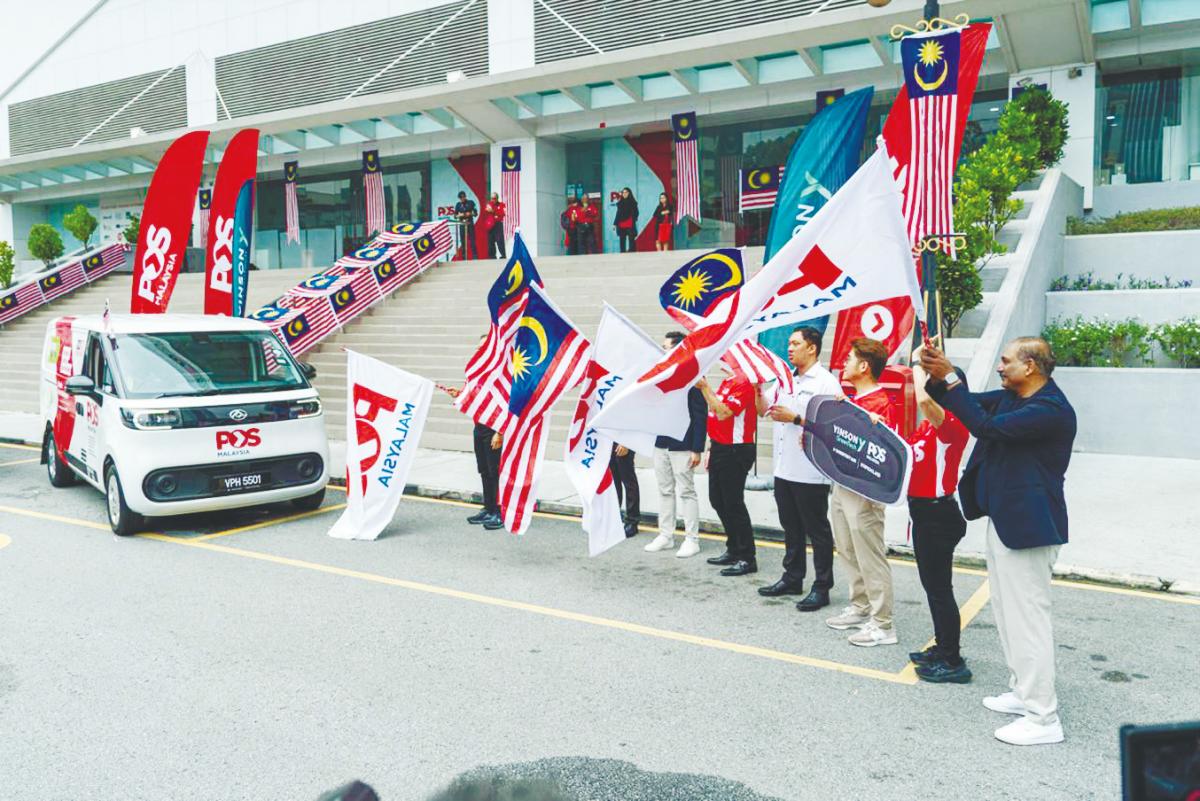KUALA LUMPUR: Pos Malaysia Bhd has expanded its electric vehicle (EV) fleet with 136 new Maxus eDeliver 3 vans, marking a step forward in its goal of becoming a fully electric logistics operator by 2030.
The handover, held in conjunction with World EV Day 2025, extends the national courier’s EV fleet to 1,252 two-wheelers and 400 vans, the largest in Malaysia’s logistics sector. For the first time, the new vehicles will also be deployed in East Malaysia.
Group CEO Charles Brewer said the transition to cleaner transport is both a sustainability commitment and a financial necessity.
“We want our operations to be free of carbon dioxide by 2050. Today’s delivery is not just about adding vehicles, it’s about making sure we evolve rapidly as an organisation,” he said.
“These electric vans reduce delivery costs by around 30% compared to internal combustion engine vehicles, while also lowering our environmental footprint.”
Brewer acknowledged that while Pos Malaysia has been modernising since 2021, the company faces structural challenges. Mail volumes have plunged from 1.3 billion letters in 2012 to about 300 million annually today, while footfall at post offices has fallen by nearly 18% a year in recent times due to digitalisation.
“We cannot make mail come back and we cannot reverse the trend of customers transacting online instead of visiting post offices,” he said.
“That creates structural revenue challenges while delivery costs keep rising with new housing developments. Our job is to find new models that work for the people, employees and shareholders.”
Still, Brewer said investments in EVs and renewable energy are proving cost-effective. “Everything we do in sustainability must tick three boxes: good for people, good for the planet and good for our profit and loss. The EV fleet and solar panel rollouts meet all three.”
The new vans were supplied by Weststar Maxus and leased through Yinson GreenTech, which will provide after-sales support, telematics and route optimisation technology.
Weststar Group managing director Tan Sri Dr Syed Azman Syed Ibrahim said the partnership is part of Malaysia’s wider climate ambitions.
“The Maxus eDeliver 3 is a symbol of innovation and environmental responsibility. Together with Pos Malaysia, we are contributing to the nation’s low-carbon future,” he said.
Weststar Automotive Division CEO Syed Muhammad Ammar Syed Azman said that policies under Budget 2025 have helped create a positive environment for EV adoption.
Yinson GreenTech managing director Kelvin Soon said his company remains committed to supporting Pos Malaysia’s fleet transition. “Our collaboration reflects a shared responsibility to accelerate the logistics sector’s shift toward greener operations.”
According to Pos Malaysia, each EV van reduces about 1.11 tonnes of carbon dioxide annually. Collectively, its EV fleet has already clocked 7.2 million kilometres of emission-free deliveries, equivalent to circling the globe 179 times.
The company has set a target of 100% green first- and last-mile deliveries by 2030, while remaining flexible to future technologies such as hydrogen or autonomous vehicles. By 2050, it aims to achieve net-zero carbon emissions across its operations.
Beyond EVs, Pos Malaysia is installing solar panels across its network of post offices and hubs, with 17 sites already equipped and a target of 600 in the pipeline.
While Brewer declined to comment on the timing of a financial turnaround, citing market regulations, he stressed that sustainability investments are part of a broader transformation strategy.
“This is good for our people, good for the planet and good for our finances. Every letter and parcel we deliver must embed environmental stewardship and responsibility. The future of delivery is electric,” he said.
Brewer emphasised that the rollout of these vehicles is not just symbolic but operationally significant, enabling Pos Malaysia to serve more customers with cleaner technology while lowering long-term fuel and maintenance costs.
“Our investments in electrification also demonstrate our readiness to embrace future green innovations in logistics,” he concluded.









